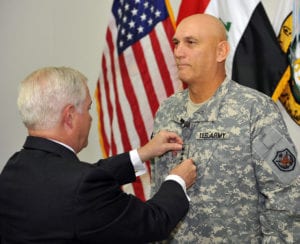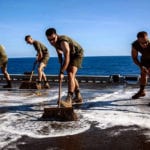As a child George was a grief to his parents and required frequent beatings. As a student he was completely undistinguished. To his prosperous businessman father, he seemed an undisciplined drifter. What hope for success could there be for such a man, without direction or ambition?
Then, after seeing the adulation that returning Spanish American War veterans received, George decided he wanted to become an Army officer. But to his parents, teachers and siblings George was hardly “Officer Material.” His grades fell pitifully short of West Point’s entrance standards. Undeterred, George then sought entrance into the Virginia Military Institute. But his older brother—himself a student a VMI—proclaimed George unfit for military service and predicted his failure.
Mixed Success
That did it. Weary of his own family’s dismal expectations, George was determined to prove them wrong and to be successful at VMI. He was. Though he graduated only 15th in a class of 32, he strove to discipline himself and cultivate his leadership and organizational skills. As a result he earned a promotion to Captain of the Corps of Cadets.
But it was a battle every step of the way, both to get a commission and to get rank. George was consistently overlooked for key command positions. Consigned to work behind the scenes as a staff officer, he watched younger officers bask in the limelight and move ahead of him up the career ladder.
Another strike against him was his frankness with superiors and his refusal to “brown nose.” For instance, when the fierce and formidable General Pershing openly reprimanded George’s own division commander, he went to his defense and highlighted flaws in Pershing’s own handling of the war. To all observers this warranted the proverbial “kiss of death” from Pershing. But it had the opposite effect. Pershing valued his candor, took George into his staff, and became a life-long friend.
At the Top

Again, years later, after he joined the staff of President Franklin Roosevelt, George rebuffed the President’s patronizing attitude. Other staff members expected George to “get the boot.” But the President did the very opposite. He promoted George to the rank of General and elevated him to Chief of Staff of the Army. Yes, I’m talking about General George C. Marshall, whose organizational genius, cultivated through decades of selfless service and faithfulness in obscure, thankless positions, had made him the most indispensable man of WWII. Since then, many heralded General Marshall as the greatest Soldier America ever produced. Winston Churchill praised him as “the Organizer of Allied victory.” He became the first Five-Star General since General Pershing.
After the war he served as Secretary of State and, later, Secretary of Defense. Eventually, he came to be acclaimed world-wide as “the Architect of Peace.” His “Marshall Plan” received credit for saving Western Europe from economic collapse and ultimately winning the Cold War. And, in 1953, George C. Marshall became the first Soldier ever to receive the Nobel Prize—for peace!
Stick It Out
Perhaps the limelight and the most-visible assignments have eluded you as well. Perhaps, time after time, you’ve been forced to labor on in the realm of obscurity. Don’t lose heart, nor be shortsighted. By your faithfulness and dedication to inglorious jobs, ultimately assigned to you by a Power greater than the Army, you are becoming a person of value. Remain faithful and God will make you a person of destiny. Consider the words of Jesus, in the Parable of the Talents: “Well done, good and faithful servant. Because you were faithful with a few things, I will put you in charge of many things. Enter the joy of your master” (Matt. 25:23).
PRAYER:
Dear Father in heaven, help me to be faithful in all the tasks You give me. When days, weeks and years go by without recognition or the praise, help me look beyond all earthly rewards to You, who sees in secret and promises to reward all that is done for Your glory. Amen.
In article photo: General Promotion by the U.S. Army licensed under CC BY 2.0







